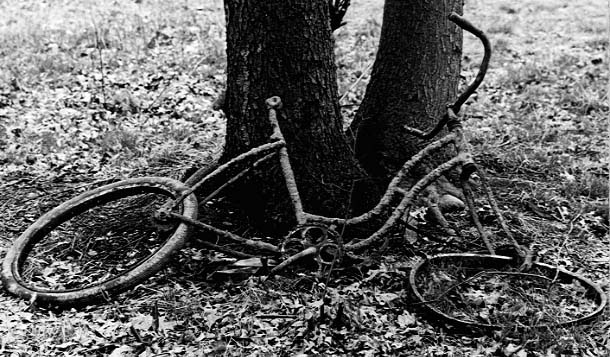From rubbernecking a serious fender-bender on the highway to a flattened home from a midwest tornado, all of us (though we won't admit it) have a curious fascination when someone's way of living is violently interrupted. I know that's why I look at an accident on the shoulder or can't stop watching "coverage" of Hurricane Katrina. The toxic gumbo that was predicted, with its floating coffins and dangerous oils remaining for days, fascinated me. Oh sure, I didn't want any of it to occur, but I kind of wanted to see just what it would look like (if those ideas could somehow coexist). Of course it's only out of curiosity and not because of any harmful wishes. I know I'm not the only one.

Natural disasters are a boon for TV/Radio ratings and print sales. Radio reports and newspaper articles (even with a few pictures) describe what took place, but nothing compares to the motion of video and watching a piece of siding fly all the way down the road, instead of a newspaper's snapshot of the siding "still" down the road. There's a reason why video is more popular than online slideshows. Though I'd like to think all news directors and their companies don't wish harm on anyone or anything else, they do enjoy incredible disasters like Hurricane Katrina because it means more money for them.

The general public wants to know that residents are okay...just as much as they want to hear about flooding, broken windows, and downed powerlines. Sure, there's a small percentage of the viewership with a personal interest in how SE Louisiana and parts of Alabama are doing, but after hearing about the well-being of the affected area's population, most of them only watch out of curiosity. During the night, all forms of media (TV, radio, print, Internet) are on equal footing (no pun intended) because there's little to actually see in the dark (duh) and reporting avenues do not differ...reading a print/online report is akin to having someone read the report to you on the radio which is akin to seeing that someone read the report.

It's once daylight breaks that TV blows the other forms of media out of the water (really, I don't intend these puns). If all forms are available to you, why listen to the radio or look at a still photograph? TV combines every form - plus you've got video. When Katrina was on its way to the gulf coast and landfall was predicted for Monday morning, you could hear a loud cheer from every TV news director. They were able to send their stubborn camera crews and reporters outside to get video of Katrina as it swayed stop signs and toppled trees (actually getting it as "it happens") instead of waiting for daybreak to see the destruction left. Seeing WFOR's local reporter Brian Andrews fall on his face trying to walk in the storm is incredibly stupid and unsafe, yet I took some satisfaction in his demise. Heaven forbid we have to wait until after the storm passes overnight to find out what happened. By the way, it's funny that reporters first said New Orleans got by unscathed b/c it wasn't the biggest direct hit possible, nevermind the destruction it ended up doing.

The sad truth is high ratings only happen when you show/report the most destructive events with dramatic storytelling. Water flowing down Canal Street will not only bring lots of debris, but also disturbing discussions among TV execs about the possible bodies, toxic gumbo, and the guarenteed ratings they'd carry. The general public is addicted to stories of destruction and the media just does its natural part by feeding the beast what it wants. Try as I might, I can't fault news directors for feeding the public what it continues to starve for - I just wish everyone (like myself) would stop gorging themselves.








































